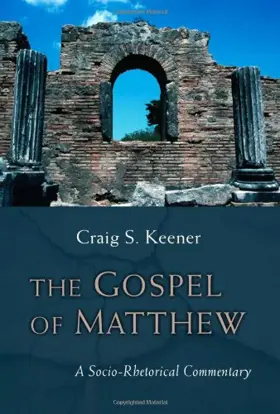

The Gospel of Matthew: A Socio-Rhetorical Commentary
in Socio-Rhetorical Commentary
Pages
1090
Publisher
Eerdmans
Published
2009
ISBN-13
9780802864987
This excellent commentary on Matthew offers a unique interpretive approach that focuses on the socio-historical context of the Gospel and the nature of Matthew’s exhortation to his first-century Christian audience. By merging a careful study of Matthew’s Gospel in relation to the social context of the ancient Mediterranean world with a detailed look at what we know of first-century Jewish-Christian relations, Craig Keener uncovers significant insights into the Gospel not found in any other Matthew commentary.
In addition, Keener’s commentary is a useful discipleship manual for the church. His unique approach recaptures the full “shock effect” of Jesus’ teachings in their original context and allows Matthew to make his point with greater narrative artistry. Keener also brings home the total impact of Matthew’s message, including its clear portrait of Jesus and its call for discipleship, both to the Gospel’s ancient readers and to believers today.
In addition, Keener’s commentary is a useful discipleship manual for the church. His unique approach recaptures the full “shock effect” of Jesus’ teachings in their original context and allows Matthew to make his point with greater narrative artistry. Keener also brings home the total impact of Matthew’s message, including its clear portrait of Jesus and its call for discipleship, both to the Gospel’s ancient readers and to believers today.
Reviews
A solid commentary, with a specific purpose, so not as relevant and useful for certain discussions as it is for others.
This is the most recent of the commentaries I have chosen and is part of a series published by Eerdmans which attempts to read the biblical books against both a social and rhetorical background. What this means is that the commentary works hard to place Jesus in a proper context (Second Temple Period Judaism) but also to place Matthew as an author in his (later) context. In fact, Keener is “more inclined to accept the possibility of Matthean authorship” than in his earlier work on the Gospel (p. 40). The gospel was written in Syro-Palestine in the wake of the Jewish War, and “within the range of” develop rabbinic influence. Keener therefore reads Matthew as a Jewish Christian voice responding to the tragedy of A.D. 70. One of the advantages of the Socio-Rhetorical series is the use of Excursus to treat issues which are outside of the normal scope of a commentary. For example, Keener has more than 3 pages on demons and exorcism in the Greco-Roman word, a section dense with primary sources. These excursuses are the highlight of the commentary.
[Full Review]

